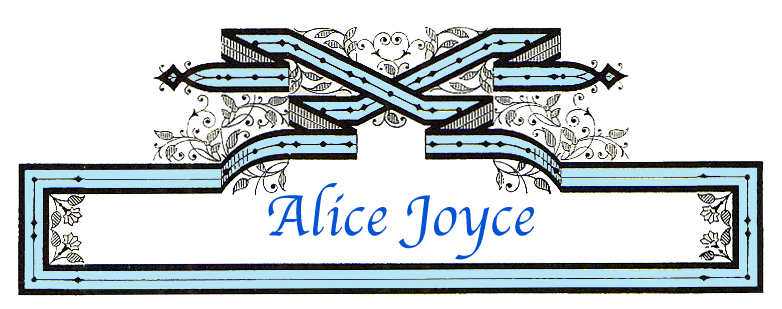

This 1914 film was adapted into a short story for the in the October 1914 issues of Photoplay Magazine and Motion Picture Magazine. Below are 4 scans from the latter and below that is the text of the Photoplay version. The pictures on pages 42, 43 and 45 of the Motion Picture Magazine version are the same as the last three 'For Mary's Sake ...', 'While He Was Still ...' and '"Mary," He Cried...' used in the Photoplay magazine adaptation in the same order (though the last is cropped more closely than in the Photoplay version).
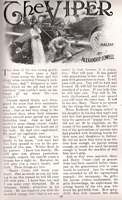 |
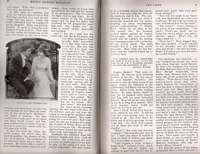 |
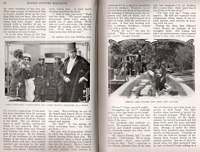 |
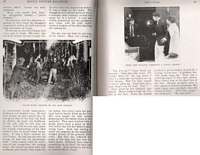 |
Nature must have intended that Mary Putnam should be spoiled. For she had so contrived matters that the spoiling was nearly inevitable as anything in this life can be. She was an only child, for one thing. She was the child, moreover, of a marriage contracted when her father was no longer a young man. And--her mother had died, leaving the baby in her father's care, when Mary was only a tiny girl. If that were not enough, there was another reason. Henry Putnam, her father, had had a long hard struggle to achieve, first comfort, then independence, and finally wealth.
[Omitted: Photo of Alice Joyce near a large garden trellis, looking at a man on the floor assisted by several other man. One man is holding a bottle by the neck. Caption: He Stretched the Man of the Floor: In a Moment the Place Was in an Uproar]
His youth has been embittered by his being denied of all the opportunities for pleasure that come, normally, to a young man. Poverty alone could hardly have repressed him; there had been other factors. He had been obliged to devote all he could earn, for many years, to the payment of debts contracted by him during the long illness of his parents. And, like many men who have risen from troubled beginnings, he was determined that his daughter should enjoy the privileges of youth that had never been his.
[Omitted picture of Joyce at the bottom of a staircase while a policeman grapples with a man and an older man holds out his hand. Caption: Putnam, for Mary's Sake, Got Rid of the Policeman Who Had Entered to Arrest Him.]
And so Mary had grown up with few restraints. Her own instincts were trustworthy, up to a certain point. But it is only in the most exceptional people of Mary's age, that instinct can be altogether trusted. There is required the advice, the suggestion, at least, if not the control, of older and wiser persons. A mother would have been able, doubtless, to avert the disaster that was to come to Mary. But her father, idolizing her, was in no position to do it. Indeed, he did not clearly see what was in the wind. And he was amazed and, at first, indignant, when his partner, Richard Kent, approached him one day on the subject of Mary. Kent was a younger man than Putnam, but his extraordinary sagacity in matters of real estate had won him a quick promotion when he had entered Putnam's service, and he was a partner in the most important business of its kind in the whole state when still at an age that sees most men fighting for a foothold.
"By the way," said Kent. "I see Mary's around the office quite a good deal lately."
"I suppose so," said Putnam, with the indulgent smile that always came over his face when Mary was mentioned. "She runs out of money once in a while, you know--and she always drops in here on those occasions.
"H'm--yes," said Kent. "But--you've got to forgive me if I seem to butt in. Did you know she's seeing a lot of young Crane?"
"Crane?" Putnam's brows were twisted in a frown at the name. "I don't see why! She can't have any business with him!"
"I'm afraid it isn't business. That's just why I'm speaking. She seems to be--er--well, to be getting interested in him!"
Putnam swung around in his chair.
"Nonsense!" he ejaculated. "And, if it was so--just why do you speak of it?"
"I--why--oh hang it--I've always--I want to marry Mary myself! That's why, if you must know! I wasn't going to speak just yet--I hoped to change her attitude toward me! She seems to regard me as a sort of junior father now--and--"
"I'll be damned!" said Putnam, heavily. He was in that dazed condition that afflicts the fathers of idolized daughters when the horrible idea of their marriage is first definitely and concretely suggested. He had always supposed, vaguely, that Mary would get married, sometime. But there is something about the definite proposal, when marriage is linked with an actual man, that is appalling! Putnam was no exception to the rule.
"Have you spoken to her?" he asked.
"Of course not!" snapped Kent. "She'd laugh at me! But I've tried to show her that there had to be a change in our relations. I--well, I'm taking her to the theatre tonight!"
Suddenly the absurdity of his own position struck Putnam, and he laughed, rather sheepishly. There was confession in the look he turned on his partner.
"Forgive me, Dick," he said. "You've got such an old head on your shoulders when it comes to real estate that I'm apt to forget you're so much younger than I am. You're older than the girl, of course--but, still--if she wants you, I'll be mighty glad! I can't think of any man I'd rather give her to--though, for that matter, I don't want to give her to any man!"
Their hands met then.
"I understand that," said Kent. "And--I don't wonder! But I want her--more than I've ever wanted anything! And, if she says yes, she'll never have cause to regret it!"
But Mary was not to say yes--to Kent. Her father's partner had guessed shrewdly as to Crane, but not shrewdly enough. He did not dream that things had gone as far as they did. And, on the same night that saw Kent propose to Mary, and hear her rejection, Crane put his fate to the test, and was accepted.
[Omitted, photo of a man with a gun in one hand, leaning over with a telephone receiver in the other hand, listening. Another man hidden behind the curtains. Caption: "Just a Moment, Sir," He Heard James Say. "There's Something Wrong."]
"Dad won't like it," said Mary, judicially. "But he'll come around. I can always make him do that. Come tomorrow afternoon, Frank, and we'll tell him."
"Hadn't you better sort of break it to him, first, alone?" suggested Crane, nervously.
"No!" said Mary, proudly. "It's nothing to be ashamed of--that we love one another. You must be there, too.""
He was. He would have faced worse dangers than the wrath of his employer for Mary's sake--and for Mary's fortune's sake. There was a scene. Putnam, already smarting because of what Kent had told him, but of course, unable to complain of that, flew into a rage. And it took all of Mary's diplomacy to bring him around. That she had to do alone. But she did it, and Putnam sent for Crane, already wondering where he should find a new job, and told him that he had changed his mind.
"At least, I've decided not to interfere," he said, stiffly. "I don't approve--I feel that you're not the man for my daughter to marry. But, as long as she wants you, I'll keep an open mind, and I'll give you every chance to prove to me that I'm wrong, and that there is the right stuff in you. But, if you don't treat her properly God help you!"
Kent sought Crane out as soon as he heard the news.
"Congratulations, Crane," he said. "You've won a wonderful girl. Go in, now, and make good in every other way! You've certainly a great incentive!"
"Thanks, Kent, drawled Crane, looking the junior partner insolently in the eye. "I appreciate what you say. And I guess I can attend to my business affairs all right!"
Kent winced at the insolent familiarity of his tone. But he made no comment. He only hoped, for Mary's sake, that she might not have a lifetime of vain regrets. But--he feared for her. About Crane there was something that men instinctively distrusted, men like Kent and Putnam.
Nor were they wrong. For a brief time Mary was happy. But her disillusionment was not long delayed. Crane was not innately vicious. He was worse; he was a weakling, incapable of controlling himself, of holding his passions and his appetites in rein. He never meant to do wrong; he seldom succeeded in doing right. As Putnam's son-in-law he began to prosper. Putnam, unwilling to have Mary feel the humiliation of being personally dependent upon him, now that she was married, backed Crane in several deals that brought him a good deal of money. Moreover, with Kent's consent, he raised his salary until it reached a considerable figure.
And the chance to cut loose was too much for Crane. He began to drink; that a married man should stay at home in the evenings did not seem to enter his mind. Mary grew nervous; at first worried, she soon became resentful. The way in which she had been brought up had not prepared her to submit tamely to the neglect that was her portion and it began, quickly, to dawn upon her that her money and her position had had at least as much as love to do with her marriage.
A climax could not long be delayed. One night, at a rough-and-ready cabaret, Crane, passing the evening with some boon companions, was attracted by a girl at a nearby table. He spoke to her; she resented the insult. Her escort sprang to her aid; Crane being half drunk, attacked him with an empty bottle. He stretched the man on the floor; in a moment the place was in an uproar, and the police had been called. Crane escaped; his taxicab was pursued, however, and a policeman forced is way into Putnam's home to arrest him.
Putnam, for Mary's sake, got rid of the policeman who had entered. But he proceeded to lay down the law to his worthless son-in-law.
"I'm willing to believe that there's still good stuff in you," he said. "But it's time for you to prove it. Cut out this night life; attend to business. And live on your salary. It's liberal, and you are not required to spend any of it on your wife. She has her own allowance from me. As for you--you will get nothing beyond your salary from me until you have proved, if you can, that you are worth something in the world!"
But Crane was already too heavily involved to be able to make good, even had he had the will to do so. He had begun to gamble heavily after his marriage, never having been able to afford to do so before. But, as Putnam's son-in-law he had been able to get credit. Tom Baxter, the best known of a ring of professional gamblers who preyed on the younger set of rich men, knew all about the Putnams; it had been an easy matter for him to inveigle Crane into playing in his rooms. Now, in the summer, Baxter conducted his gambling operations on a yacht, partly for the sake of the cooler conditions, partly to evade the police, whose jurisdiction stopped half a mile from shore, beyond which line the yacht was anchored.
For a few days after his talk with Putnam Crane, sobered, tried to check his descent of the flowery path. But Baxter, to whom he was heavily in debt, began to harass him as soon as he stopped playing. They had a savage quarrel; as a result Baxter kept his threat and wrote to Mary. He would be satisfied, he write, if she would sign an I.O.U., in her own name, given that, he would not press his claim by going to her father. Mary, shocked and repelled, her love for Crane finally dead, showed him the note. He confessed. And Putnam heard the confession.
"That's the last straw," said Putnam, furiously. "I will give you this money. And I will keep you on, at your present salary. But you leave this house today--not to return until you have sobered and proved that you are worth while."
Crane recognized this as an ultimatum. Dejectedly, he took the money. Baxter had frightened him; he meant to pay. For Baxter knew of certain things in his past that might put him in jail; he dared not, in his sober senses, anger the gambler. But even with the money in his pocket, his besetting weakness was too strong for him. He went to the yacht to pay up; Baxter was not there. And, while he waited, he was drawn into a game of poker. Before Baxter returned he had lost every cent of the money Putnam had paid him. The gambler listened stonily to his confession.
"All right," he said, curtly, "I'll be generous with you. I'll give you twenty-four hours to find that money. If you're not back here with it by this time tomorrow I'll act--and you'll be in jail, facing a ten-year sentence!"
[Omitted, photo of Joyce looking down and clasping hands to chest, a maid has her arm around her. Two policemen look down, older man in top hat puts something in his pocket. Caption: For Mary's Sake He Could Not Allow the Man ... To Be Sent to the Chair. He Put the Hat in His Pocket
Crane knew that Baxter meant to keep his word. And he was desperate. He had no chance to raise the money; everyone, by this time, knew that Putnam had turned against him. He thought of one more appeal to his father-in-law, useless as he was sure it would be. And finally, late that night, unable to find another way, he determined to go to Putnam and tell him everything. He went; Putnam was not at home.
[Omitted: Photo of men carrying an unconscious man on a boat. Caption: While He Was Still Delirious, They Took Him Ashore at Their Retreat, Far Down the Coast]
"I'll wait," he said to James, the butler.
And, while he waited, a new scheme was born in his mind. He knew that Putnam always kept a considerable sum of money in his library, locked in a certain drawer. To pick its lock would be easy. Five minutes was enough; the money was in his hand. And then, suddenly, before he could even close the drawer, the telephone bell rang. He heard James coming to answer. In a panic, he hid behind the portieres that led into the adjoining room. James answered the telephone; Crane heard that he was talking to Putnam. And then, watching the man, he saw that he had discovered the broken lock. He saw him take a revolver from the drawer.
"Just a moment, sir," he heard James say. "There's something wrong. Come out, you--behind the portieres!"
Trapped! His evil genius guided him. He tried to escape. The two men clashed. Then, in the struggle, as he heard James gasp his name, in shocked surprise, there was a shot. The pistol had gone off. And James sank to the floor, dead--as Crane soon saw! With a cry of horror he fled from the house.
Putnam reached the house just after the crime had been discovered by another servant. The police were on his heels; Mary, supported by a maid, was looking, in pitiful horror, at the body of the faithful servant. And Putnam, with a start, recognized a soft hat that lay on the floor. Crane's! For Mary's sake he could not allow the man, villain though he was, to be sent to the chair. He put the hat in his pocket. And the murder was soon placed in the category of unsolved mysteries.
Meanwhile another tragedy had transpired. For the papers told the next day of a fire that had destroyed Baxter's gambling yacht--a fire in which only one life had been lost, that of Frank Crane, Henry Putnam's son-in-law. Baxter himself, who had escaped, described the catastrophe.
[Omitted, Photo of two men with clenched fists facing each other in a room, Joyce stands behind one of them. Caption: "Mary," He Cried. It Was His Last Word]
"Young Crane came to me to pay me some money he owed me," he said. "He acted like he was drunk--though I didn't think he was--just stupid, like, as if he'd been up against somethin' pretty fierce. I guess he dropped a lighted match as he left the cabin. Anyhow, the first thing we knew, she was blazing up. We beat it just before the fire touched the gasoline tanks--an' I guess we forgot the poor sucker. Anyhow, he turned up missin', I guess he was killed."
No trace of Crane's body was found. But there seemed no doubt of his death. And Mary, after a nervous breakdown, began to realize that fate, in taking him off, had been merciful to her. She knew, now, that it was too late, that she had never really loved the man she had married; that she had been carried away by a mad infatuation, that had not survived her first glimpse of his real character. She was shocked by his dreadful death; of course, she suspected nothing of his responsibility for the death of James.
For a long time it seemed to her that her life was ruined. But the natural buoyancy of youth sustained her; in time she began to see that she had much of life and joy still before her. Richard Kent did much to revive her. He did not press her, but in time, he renewed his suit. And this time he won the reward of his loyalty and devotion. She gave him, not a girl's impulsive love, which he had hoped to win before, but the far finer thing she could now offer--the affection of a woman, mature and conscious of herself. And so they were married, and happiness seemed about to come to her.
But Crane was not dead. He'd had been stunned by the explosion that followed the fire on Baxter's yacht; by a strange chance he had drifted across the bows of a launch owned by a gang of river pirates. They dragged him aboard. And some days later, while he was still delirious, they took him ashore at their retreat, far down the coast. These men had their headquarters in a remote spot. Their launch poked its way up a stream supposed to be unnavigable; only those who knew the narrow channel could guide even a motor boat in safety.
Here they lived, precariously. They were at odds with the law; only secrecy saved them. They were river pirates sometimes operating from their powerful launch, first in one harbor, then in another. And they did some smuggling, too. Tobacco and liquor were brought close into shore, at night, by seagoing ships and landed by the launch.
Here, when he recovered consciousness and grew strong, Crane decided to stay. Carson the head of the band, urged him to do so; Crane, fearing arrest for the murder of the butler, should he return to civilization, was glad to do so. He did not know that Putnam had covered up his crime, but he surmised that he might be supposed to be dead.
And so, for a long time, he was content. Will Carson, the leader's half witted brother, hated Crane, and feared him. But the others liked him, and he was reasonably happy. Until, one day, a month old paper came to him, telling of Mary's marriage to Kent! The account of the wedding contained references to him. His death in the fire was mentioned; there was also a reference to the mystery of the murder of the butler.
At once his evil brain saw a chance. He wrote immediately to Putnam, to say that he was alive, and to threaten to reappear unless substantial blackmail were paid. The reply was swift. Putnam wrote that he knew of his responsibility for the murder; that, unless he stayed silent, he would be charged with the crime. But Crane only laughed.
"I've got him!" he said to himself. "If he drags that up now he'll be as badly involved as I--for keeping quiet! But--to get some money? I've got to be able to play him. I'll need money for that.
He knew a way. But he hesitated to use it. There was a standing reward for the capture of the smugglers--a reward for five hundred dollars. He might betray them. But, dared he? He decided at last to do it. They trusted him utterly; it was ridiculously easy for him to accomplish the betrayal. But he made one miscalculation. He thought the whole gang would be seized and imprisoned. And--the half witted brother of the leader was not only allowed to go free; he was able to free his brother. They tracked Crane down that same night; shooting at him, they drove him to take refuge in a small boat. He rowed out frantically from the shore in it, making for a yacht that lay at anchor. Exhausted, he reached the yacht; he rushed down the steps to the cabin. And there he reeled back. For he was confronted by Mary and Kent!
"Mary!" he cried.
It was his last word. For through the porthole behind him Will Carson was leveling a revolver at his head. The next moment he fired.
Last revised April 5, 2009
Special contents © 2003, by Greta de Groat, at gdegroat@stanford.edu . All Rights Reserved